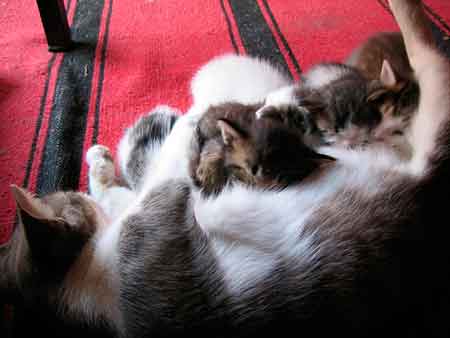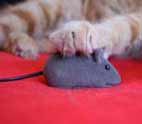Do You Have A Pregnant Cat?
Be Prepared For Your Cat Having Kittens!
A pregnant cat will behave very similar to a a normal cat and they will still want to play, climb and hunt as normal.
As a result, cat owners are often unaware that their cat is pregnant until quite near the end of their term.
It is only then when physical changes become very apparent.
In fact the only early sign of cat pregnancy may be that the female's nipples may become a little larger and pinker in colour.
It is not until the fifth or sixth week into her pregnancy that changes will become apparent, both physically and behaviourally.
On this page:
Signs of Cat Pregnancy / Nesting Behavior / First Signs of Cat Labor / What To Expect From A Cat Having Kittens / Video About Cat Pregnancy
Signs of A Pregnant Cat
A pregnant kitty will start to behave differently as she nears the end of her pregnancy. These changes can include:

Nesting Behavior Of The Mother Cat
A pregnant cat will want to seek out a nice dark quiet place to have her kittens.
Unfortunately she may choose a very unsuitable place which may cause difficulties in the home, so it is advisable to try and help her find her place by providing her with the perfect spot. This should be:
- Quiet
- Warm
- Semi-dark and secluded
- Comfortable and contained, such as a cardboard box lined with newspaper which she can tear up to make herself comfortable
- Place plenty of plastic underneath and around the box to protect your floor and furniture from any fluids.
First Signs of Cat Labor
During the early stages of labour the pregnant cat will display some signs of discomfort and what might appear to be ill health. It is important not to panic at this stage and to allow nature to take its course.
Some of these symptoms might include:
- Vomiting
- Panting
- Pelvic contractions as the kitten is squeezed into position for birth.
- There may be a small plug of blood excreted.
What To Expect From A Cat Having Kittens
Something which often surprises a new owner of a pregnant cat is the length of time labour can take.
Although there are no hard and fast rules, it is worth noting that several hours can go by between the start of labor and the cat giving birth to her kittens. It may not even be until the next day.
The first kitten is normally born within half an hour of the mother beginning to strain. She may let out a cry as the first kittens head emerges. A second kitten is then normally born between 10 to 60 minutes later.
If there are more kittens to come, the mother may then cease labour for several hours. It can even be up to 24 hours later before the rest of her kittens are born.
The mother will remove the membrane sac from around the kitten and begin to lick the kitten. This will encourage the kitten to take their first breath and get rid of any fluid from its lungs.
It is very rare that the pregnant cat cannot successfully complete labour and sort out the umbilical cord on her own without the help from a human. Even when breech presentations occur, there is rarely a problem. If difficulties do arise then a vet's advice needs to be sought immediately.
Watch this great short video from a veterinarian giving good advice about being prepared for your cat giving birth:






